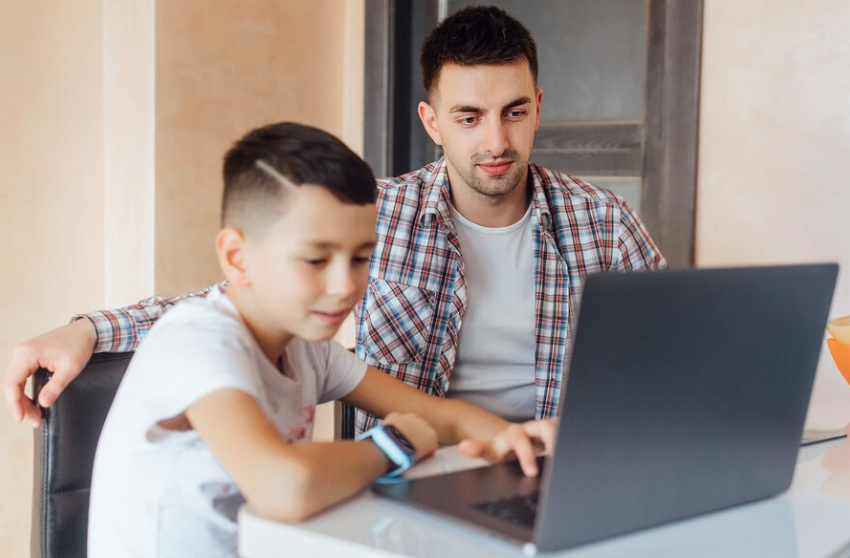As the Internet becomes more and more prevalent and children grow up in the digital age, it's more important than ever to teach them about responsible and safe online behavior.
Children are especially vulnerable online, and you wouldn't let your child wander around a neighborhood unsupervised, so why would you let them roam the web without supervision?
Switch to Teaching Kids Responsibility & Safety Online. Teaching kids responsibility and safety online is a one-person job, but it doesn't have to be a challenge!
First of all, as parents and educators guide children on how to get the best out of their online experience, it is important for them to understand how products and services can help promote safe online practices with just a few clicks.
However, if you can keep your eye on kids, you have landed on the right page!
Here are the five best strategies for teaching kids to be responsible and safe online. Without any delay, let’s jump on it.
Establishing online behavior and internet safety guidelines in any family is important to ensure a healthy and functional household. Setting clear rules and boundaries for your children is important as a parent. But it's also important to be consistent with those rules to keep children safe and responsible on social media and other online platforms.
If you're not consistent, your children will quickly learn that they can push the limits and get away with things.
There are a few different ways you can be consistent with your rules. First, make sure you're always reinforcing the rules. This means consistently rewarding good behavior and consistently punishing bad behavior.

Second, ensure you're clear about the consequences of breaking the rules. If your children know they will get a specific punishment for breaking a specific rule, they're less likely to test the boundaries.
Setting clear rules and boundaries is an important part of being a parent. But it's also important to be consistent with those rules. By being consistent, you can help your children learn to follow when setting rules and boundaries at work.
Most kids these days are tech-savvy and spend a lot of time online. While this screen time can be a great way for them to stay connected with friends and family, it can also come with risks. From cyberbullying to cyber safety, there are several dangers that kids can face when they're online.
As a parent, it's important to educate your kids on these risks so they can stay safe while they're using the internet. Here are a few tips on how to do just that:
Emphasizing the lasting impact of online actions and the importance of maintaining a positive online presence, It's important to remember that everything we do online leaves a digital footprint that can be accessed and indexed by search engines.

That's why it's important to be mindful of what we post and share online as digital citizens and teach your kids how to deal with them. Once something is out there, it's nearly impossible to take back. So it's vital to understand for them the long-term implications of their online actions.
That's not to say that we should all be living in fear of what might happen if our embarrassing teenage photos end up on the front page of the internet. But it is important to be aware that our online presence can have a lasting impact, for better or worse.
It's important to talk to kids about their online activity and encourage them to be open and honest about any concerns or questions. This can help them stay safe online and make the most of their digital experiences.
Talking to kids about their online activity can help them understand how to stay safe online. It can also help them make the most of their digital experiences by understanding how to use technology responsibly.
We must promote an open and honest dialogue about online activity and any concerns or questions kids may have. This is important to help keep them safe online and ensure that they use the internet positively and productively.
We need to encourage them to ask questions and to be curious about the online world while also helping them to understand the importance of responsible and thoughtful use of the internet.
Many influential people in the online world set a good example for others to follow. By leading by example and doing good things, they inspire others to do the same.

This is especially important for young people, who often look up to these online influencers as role models. By setting a positive example, an influencer or trusted adult can help kids to develop into good, kind, and caring adults.
They can help kids learn how to make good choices and be good citizens. Adults can also help kids learn about the importance of giving back to their communities and helping others.
As the internet becomes increasingly commonplace in society, so does the need to protect schoolage children from its dangers.'
There are many tools available to help parents do this, including internet filters and monitoring software.
Internet filters can help to block access to inappropriate websites and content. This can be a useful tool in preventing children from coming across things that they should not see. However, it is important to remember that internet filters are imperfect and can sometimes block perfectly safe websites.
Monitoring software can be used to track a child's online activity. This can be useful to see what they are looking at and doing online. It can also help to identify any potential problems early on.
In conclusion, it is important to educate kids on online risks. By teaching them to be responsible and safe online, we can help them avoid many potential risks.
Implementing these strategies that can help achieve this goal, including monitoring their online activity, communicating with them about online safety, and teaching them how to use privacy settings, including teaching kids to use strong passwords, be aware of what they are sharing online, and to report any suspicious activity.